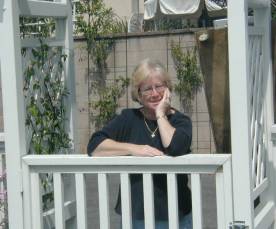Sarah Houghton-Jan (Librarianinblack) and Aaron
Schmidt discuss ways to serve teens by creating a
teen-friendly environment in the physical library as
well as virtual spaces.
The focus of this workshop is on why serving teens is
important, integration of gaming in libraries
(particularly public libraries), and the need to
create teen-friendly spaces. This discussion of
technologies to use with teenagers (as well as others)
who use contemporary methods of communication is
particularly relevant to community colleges as they
seek to meet students where they are.
Discussion focused on “Virtual Reference” and the
issues surrounding why is often is not that effective.
Presenters supplied examples as well as scripts used
with Instant Messaging at the Reference desk.
One of the most amusing parts of this presentation is
the “Environment of No”. The presenters bring in
pictures they have taken of all the ways we say NO to
our patrons. Examples…”NO food or drink,” “Absolutely NO cell
phones on this floor” No, no, no!
They also presented some creative approaches such as
the “Get in the zone: Cell phones zone.”
Blogs and the role they can play cannot be overstated.
Sites worth exploring:
• Library Garden… http://librarygarden.blogspot.com/
(Library Garden has been conceived as an ongoing
conversation among librarians with differing
perspectives (public, academic, consortial, state,
youth, LIS) but one shared goal: ensuring the health
and relevance of libraries.
Library Garden is maintained by a team of contributing
editors. We will each contribute to the blog, offering
our individual perspectives on issues that affect or
relate to libraries of all types. But we will also get
together for regular topical conversations --
conversations with each other, with others, with you
-- and post those conversations to the blog.
• LAPL’s Teen Read http://www.lapl.org/ya/index.html
My Own Cafe is a place where teens in Southeastern
Massachusetts can find out what other teens in their
own, and nearby communities, are talking about,
reading, listening to, watching, playing, and doing.
It's a place to find information and post information.
It's a place to do research and get help with
research.
• Denver Public Library’s Myspace page
http://www.myspace.com/denver_evolver
• And in my wanderings I found a Wikipedia entry on
Myspace and Teens in Librarieshttp://www.libsuccess.org/index.php?title=MySpace_%26_Teens
The presenters also spoke about the prevalence of
Ipods and the services that can meet students here:
Podcasts and vidcasts, books on iTunes, teens
recording local book reviews, recording poetry
readings, game nights, etc. (Suggests posting vidcasts
to UTube as well.)
• More Sites worth exploring: Cheshire Public Library
has a Teen driven magazine that is released as a
podcast
• Thomas Ford Memorial Library…books on IPOD
(purchased books from Itunes, cataloged them and put
them in the catalog)
• Cherry Hill (NJ)…ripped entire audio tape collection
to iTtunes
• Gwinnett County Public Library had a “Rock the
Shelves” night…
• Meebo.com…check it out…
• Flickr…easy way to get photos on the web…search
“Library” on Flickr to see what libraries are doing
• Myspace…gets more hits than Google…
• Wikipedia…is PCC in it? Shatford Library in it?
A side light to this conference: SIRSI has an RSS
feed called “Word to the Wise”. You can sign up and
get weekly emails that bring you up to date on new
technologies and the vocabulary needed to understand
them.
Excellent seminar! Recommended for all! It will raise
your consciousness…especially when you ask yourself
“why not?”

